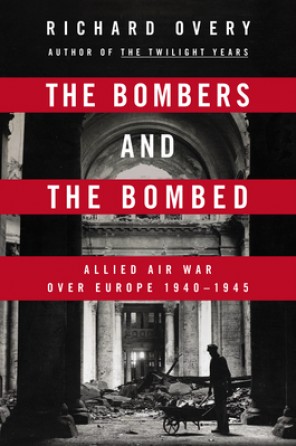Steve, that review requires a subscription to the Wall Street Journal.
I respect Prof. Tooze's demurral with Prof. Overy, but both are qualified (IMO) to make their thesis. I was able to read the review in its entirety, and I simply disagree with it, primarily because Prof. Tooze is writing about what Prof. Overy didn't do, and trying to paint him as overly concerned with the morality of bombing. I did not find this to be the case when reading the book, and it's quite obvious to any disinterested reader that Prof. Tooze is a bit too intent on defending the honor of the RAF ("if they'd had more & better planes, if they'd had better fighter escorts").
I should point out that the Nazis do not agree with Tooze's theory that the RAF's bombing campaign was going to cripple war production. They are already in 1943 dispersing their industrial base to targets outside the cities. IIRC what Speer was concerned about was more "terror raids" like Operation Gomorrah (the fire raids on Hamburg) that might lead to civil unrest, saying "if we have a few more like that, we're finished.
That didn't happen; the Nazi terror apparatus was too powerful and pervasive. No one dared resist.
Yet even with Hamburg, Overy points out that war production there returned to pre-Gommorah levels very quickly. The kind of fire raid that destroyed the central parts of the city could not be duplicated again there, and was possible in other cities only during certain conditions (hot, dry, windy nights where the weather fanned the flames of the incendiaries).
Finally, though, Tooze's position is that the RAF should have continued bombing the Ruhr industrial areas and not switched to Berlin (a target of limited military value, aside from its political prominence). Overy is not speculating on what the RAF might have done, but what it did do. He concludes area city bombing was ineffective in shortening the conflict. Further, the switch to bombing Germany's oil production facilities was forced on Harris & Bomber Command. He wanted to continue the terror raids, and had no faith attacking the means of production would work. I can only suspect that a deep personal animus against the Germans fueled Harris's actions, but that's my own analysis.
There is even an argument that city bombing perhaps even hardened the German will to resist and fight on. Goebbels asked average people to accept the notion of ausharren or "to endure hardship," and after the war, the Nazis said that it was the US "precision" daylight bombing that did the most to harm their ability to fight, not the RAF nighttime bombing.
Sadly I see the same nationalistic justifications in some of what Prof. Tooze writes that prevent these discussions from getting to the bottom of things.


























